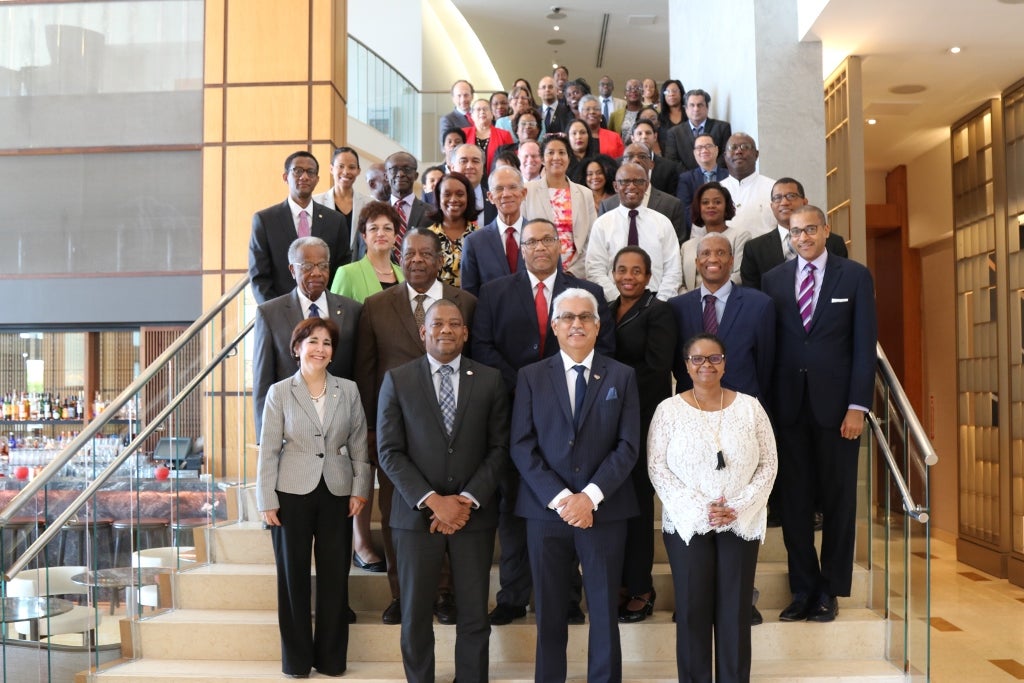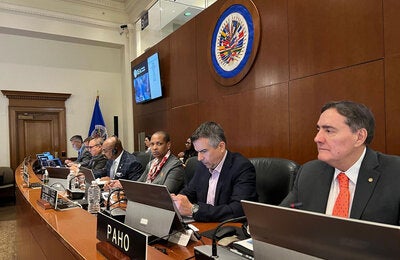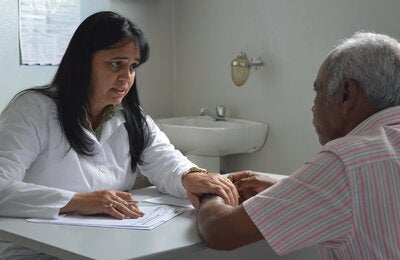 Port of Spain, March 10 (PAHO/WHO) - Government ministers from different sectors met with academicians, judges from the Caribbean Court of Justice (CCJ), Food and Agriculture Organization (FAO), representatives of the CARICOM Secretariat, organs and institutions and civil society, on March 10 to discuss that the use of laws and regulations to help reduce noncommunicable diseases, which account for three out of four deaths in Caribbean.
Port of Spain, March 10 (PAHO/WHO) - Government ministers from different sectors met with academicians, judges from the Caribbean Court of Justice (CCJ), Food and Agriculture Organization (FAO), representatives of the CARICOM Secretariat, organs and institutions and civil society, on March 10 to discuss that the use of laws and regulations to help reduce noncommunicable diseases, which account for three out of four deaths in Caribbean.
Noncommunicable diseases (NCDs), including cardiovascular disease, diabetes, cancer, and chronic respiratory diseases, together with their four shared risk factors - tobacco use, harmful use of alcohol, unhealthy diet, and physical inactivity - are the leading causes of death, illness and disability in the Caribbean. High rates of NCDs are the reason that people in the Caribbean have a greater probability of dying prematurely (before age 70) than people from any other subregion of the Americas.
Port of Spain, March 10 (PAHO/WHO) - Government ministers from different sectors met with academicians, judges from the Caribbean Court of Justice (CCJ), Food and Agriculture Organization (FAO), representatives of the CARICOM Secretariat, organs and institutions and civil society, on March 10 to discuss that the use of laws and regulations to help reduce noncommunicable diseases, which account for three out of four deaths in Caribbean. Noncommunicable diseases (NCDs), including cardiovascular disease, diabetes, cancer, and chronic respiratory diseases, together with their four shared risk factors - tobacco use, harmful use of alcohol, unhealthy diet, and physical inactivity - are the leading causes of death, illness and disability in the Caribbean. High rates of NCDs are the reason that people in the Caribbean have a greater probability of dying prematurely (before age 70) than people from any other subregion of the Americas.
The meeting, took place in Port of Spain, brought members of the CCJ Academy of Law together with representatives of relevant CARICOM organs and institutions, subregional partners, and international organizations to discuss policies and strategies for using the law as a powerful tool to address NCDs, focusing particularly on tobacco control legislation and laws and regulations that can help prevent obesity.
The meeting was organized by the Pan American Health Organization/World Health Organization (PAHO/WHO), the Caribbean Court of Justice Academy of Law and FAO.
PAHO/WHO is encouraging Caribbean authorities to adopt effective laws and regulations that can contribute to reducing the burden of NCDs and their risk factors as well as their social and economic consequences.
Although progress remains insufficient, there are examples of best practices in the Caribbean that could to be scaled up. They include taxes on sugar-sweetened beverages, bans on the sale of sugary beverages in schools, and progress on tobacco control legislation in several countries. Caribbean heads of government and other CARICOM leaders have repeatedly called for expanding such measures to help reduce NCDs.
Representatives of Guyana, Suriname, and Trinidad and Tobago will present their countries' experiences and lessons learned in using laws and regulations to address NCDs. Other subjects will include the role of community law in addressing NCDs, how to mobilize political will to advance the use of legal measures, and how to harmonize policy approaches to face this challenge.



